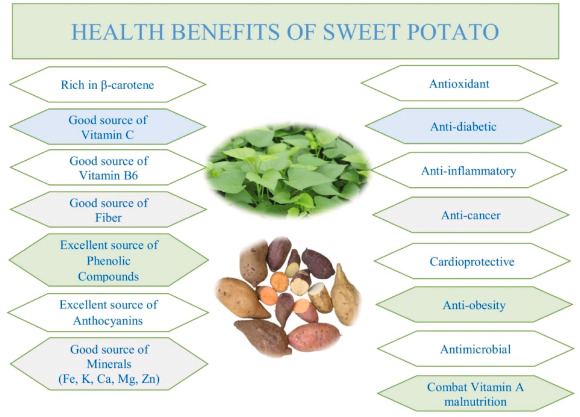Sweet potatoes are not only delicious and easy to use, but they also have a lot of health benefits. Sweet potatoes are good for you in many ways because they are full of important nutrients, antioxidants, and fiber. These colorful root veggies are known as “nutritional powerhouses” because they do so much good for the body. For example, they help keep the digestive system healthy, boost the immune system, protect the eyes, and keep blood sugar levels in check.
In this article, we’ll look at the many ways sweet potatoes can be good for your health and give you evidence-based information to help you use them to their full potential. So, let’s look at the amazing health benefits that sweet potatoes have to give.

Sweet Potato are Highly Nutritious
Sweet potatoes are not only delicious, but they also have a lot of good nutrients. These colorful root vegetables are full of important vitamins, minerals, and antioxidants that help your general health and well-being.
One of the most notable things about sweet potatoes is the amount of vitamins they have. Also, sweet potatoes have a lot of vitamin C, which works as an antioxidant to protect cells from damage, help make collagen, and boost the immune system. [2] They also have a range of B vitamins, including folate, which is especially important for pregnant women because it helps make DNA and divide cells. [3]
In terms of chemicals, sweet potatoes are high in potassium, an electrolyte that helps control blood pressure and keeps the heart working well. [4] They also have manganese, which helps with bone growth and metabolism, as well as copper and iron, which are needed to make red blood cells and keep energy levels high. [5]
Also, sweet potatoes have an amazing amount of fiber. [6] The fiber in sweet potatoes helps with a lot of things, like healthy digestion, preventing constipation, and helping with weight control. It also helps keep blood sugar levels steady and gives you a feeling of fullness, which makes it easier to control your hunger.
Another thing that stands out about sweet potatoes is that they have a low glycemic index (GI). [7] The low GI rating of sweet potatoes means that they are digested and absorbed more slowly, which means that glucose is released into the bloodstream more slowly. Because of this, they are a great choice for people who want to control their blood sugar levels and keep a steady amount of energy throughout the day.

Sweet Potato Promotes Digestive Health
Sweet potatoes are not only a tasty addition to your meals, but they also help your gut health in a big way. [9] Because of how high in fiber they are and how different they are, they are a great way to keep your gut system healthy.
One of the best things about sweet potatoes for stomach is that they have a lot of fiber. About 4 grams of nutritional fiber can be found in a medium-sized sweet potato. Fiber is important for keeping the bowels moving regularly and preventing constipation. [10] It gives the stool more bulk, which makes it easier to move through the stomach and helps the bowels work well.
The fiber in sweet potatoes helps keep you from getting constipated and also acts as a prebiotic, which helps beneficial bacteria grow in your gut. These beneficial bacteria, which are also called probiotics, are very important for a healthy gut microbiome. They help digest food and absorb nutrients, boost the immune system, and protect the body from dangerous pathogens. [11]
It has been shown that eating sweet potatoes increases the number of beneficial bacteria like Bifidobacterium and Lactobacillus in the gut. Short-chain fatty acids (SCFAs) are made when food fiber is broken down and fermented with the help of these bacteria. [12] SCFAs feed the cells that line the colon and help create a healthy environment in the gut.
Also, sweet potatoes have something called “resistant starch,” which is a type of fiber. Starch that doesn’t break down in the small intestine goes straight to the colon. In the colon, it acts as a food source for the production of more SCFAs. This helps keep the colon cells healthy and creates a good environment in the gut. [13]
The fiber and resistant starch in sweet potatoes also help you keep your weight in check. These parts help you feel full and control your hunger, which makes it less likely that you’ll eat too much and helps you keep a healthy weight.
It’s important to keep in mind that different people may have different reactions to sweet potatoes, even though they can be good for your gut health. Some people may get more gas or feel bloated when they eat more fiber. It is best to slowly add sweet potatoes to your diet and drink a lot of water to help your body digest them.

Sweet Potato Boosts Immune System
Because they have a lot of vitamins A, C, and E, sweet potatoes can be a strong ally in building up the immune system. These vitamins are very important for immune function and keeping the body from getting sick.
One thing that makes sweet potatoes stand out is that they have a lot of vitamin A. In fact, a single medium-sized sweet potato can provide more than 400% of the daily recommended intake of vitamin A. [14] Vitamin A is important for keeping the skin and mucous membranes healthy. These parts of the body act as a barrier against dangerous pathogens. It is also important for the growth and control of immune cells like T cells and B cells, which are part of the immune reaction.
Vitamin C is another nutrient in sweet potatoes that helps the nervous system. [15] This vitamin is a strong antioxidant that helps neutralize harmful free radicals and protect immune cells from oxidative stress. [16] Vitamin C also helps your body make more white blood cells, which are very important for fighting diseases. By eating sweet potatoes, you can make sure you get enough vitamin C and help your immune system work better as a whole.
Also, sweet potatoes have vitamin E, which is another powerful antioxidant that helps the nervous system. [17] Vitamin E protects defense cells from damage caused by oxidation and helps them work at their best. It also helps control the function of immune cells, making them better able to fight off pathogens.
The vitamins A, C, and E in sweet potatoes work together to give the nervous system a strong defense. These vitamins work together to help each other do their jobs and boost the defense system. They help the body make antibodies, which find and kill pathogens, and keep the nasal membranes strong, which keeps pathogens from getting into the body.
Eating sweet potatoes can also help keep you from getting common illnesses. Their ability to boost the immune system can make illnesses like the common cold or respiratory diseases less severe and last less time.
Even though sweet potatoes can help keep your immune system healthy, they should be part of a well-balanced diet that also includes a wide range of other nutrient-rich foods. A strong immune system also depends on getting enough sleep, working out regularly, and finding ways to deal with stress.

Sweet Potato Supports Eye Health
Sweet potatoes are not only tasty and useful, but they can also help you keep your eyes healthy and keep your vision clear. They have a lot of nutrients, like beta-carotene, which is important for good eyesight and avoiding age-related macular degeneration (AMD). [18]
Studies have shown that giving children as little as 125 g of orange-fleshed sweet potatoes per day can help treat or avoid vitamin A deficiency and protect them from night blindness. [28]
The body turns beta-carotene, an antioxidant that is found in large amounts in sweet potatoes, into vitamin A. The light-sensitive tissue at the back of the eye, called the retina, needs vitamin A to stay healthy. It is a key part of how light is turned into electrical signals that the brain processes as sight. AMD is a common eye disease that affects the central part of the retina and causes vision loss. Eating beta-carotene-rich sweet potatoes on a daily basis can help protect against it.
Besides beta-carotene, sweet potatoes have other nutrients that help your eyesight. Vitamin C is another powerful antioxidant that can be found in sweet potatoes. It helps lower the risk of cataracts, a disease in which the lens of the eye becomes cloudy. [19] Vitamin E, which is also found in sweet potatoes, helps protect eye cells from damage caused by free radicals.
Sweet potatoes are also a source of the pigments lutein and zeaxanthin, which are good for eye health. [20] Lutein and zeaxanthin are found in the macula, which is the part of the eye that controls central vision. They absorb dangerous ultraviolet (UV) light and reduce oxidative stress in the eyes by acting as natural filters. Studies have shown that eating more foods with lutein and zeaxanthin makes you less likely to get AMD and cataracts.
By eating sweet potatoes, you can give your eyes a variety of important nutrients that help you see well and protect you from age-related eye problems. But it’s important to eat a well-balanced diet with a number of other fruits and vegetables to make sure you get a wide range of nutrients that are good for your eyes.

Sweet Potato can Help to Manage Blood Sugar Level
Sweet potatoes can be a healthy choice for people with diabetes or who are trying to control their blood sugar levels. Their low glycemic index and the fact that they contain certain substances help them control blood sugar levels well. [21]
The glycemic index (GI), which is a measure of how quickly a food raises blood sugar, is not very high for sweet potatoes. Foods with a low GI release glucose into the body more slowly. This keeps blood sugar from going up and down too quickly. This makes sweet potatoes a good choice for people with diabetes or for anyone who wants to keep their blood sugar levels normal.
In addition to having a low GI, sweet potatoes have certain chemicals that make the body more sensitive to insulin. Insulin is a hormone that is made by the pancreas. It helps control how much sugar is in the blood. Insulin sensitivity is how well cells respond to the way insulin helps them take glucose from the bloodstream.
One of these is adiponectin, which is found in sweet potatoes. Adipose tissue (fat cells) releases a hormone called adiponectin, which is very important for making insulin work better. Studies have shown that having more adiponectin in the body makes insulin work better and lowers the chance of getting type 2 diabetes.
Also, sweet potatoes have a lot of fiber, which is another reason why they can help control blood sugar levels. Dietary fiber makes it take longer for carbs to be broken down and absorbed into the body. This slows the release of glucose into the bloodstream. This keeps blood sugar levels from going up and down quickly and makes glucose control more stable.
Also, the antioxidants in sweet potatoes, like anthocyanins, may help control blood sugar. Anthocyanins are the pigments that give some types of sweet potatoes their bright colors. Research shows that anthocyanins may help make cells more sensitive to insulin and reduce inflammation. This could help people better control their blood sugar.
The glycemic score of sweet potatoes can change depending on how they are cooked. The GI of sweet potatoes is lower when they are boiled or steamed instead of baked or fried. So, choosing cleaner ways to cook sweet potatoes can make their ability to control blood sugar even better.
Even though sweet potatoes can be a good part of a plan to control blood sugar, people with diabetes or other dietary needs should watch how many carbohydrates they eat and work with a healthcare professional or registered dietitian to make a personalized meal plan.
Sweet Potatoes are Good for Heart Health
Sweet potatoes are not only tasty, but they are also good for your heart. They have many nutrients, like vitamins, potassium, and fiber, that are good for your heart and lower your risk of getting heart disease.
It is claimed that the leaves and roots of sweet potatoes can warm up the body, probably because they contain sugar and other nutrients. People with asthma can benefit from its warming effect and its strong ability to clear up congestion. The vitamin C, iron, and other nutrients in sweet potatoes help treat bronchitis. [29]
One of the main things that makes sweet potatoes good for your heart is that they have a lot of antioxidants. [24] An antioxidant is a chemical that stops or cancels out the bad effects of free radicals in the body. Free radicals are unstable molecules that can damage cells and cause illnesses like cancer, heart disease, and aging to get worse. Antioxidants help get rid of dangerous free radicals in the body. This lowers oxidative stress and inflammation, which are both risk factors for heart disease. Antioxidants like beta-carotene, vitamin C, and anthocyanins are found in large amounts in sweet potatoes. [25] These have been linked to a lower chance of heart problems.
Potassium, which is another important nutrient found in sweet potatoes, is very important for keeping the heart healthy. [26] Potassium is a mineral that works against the effects of sodium to help keep blood pressure in check. Getting enough potassium has been linked to lower blood pressure and a lower chance of hypertension, which is one of the leading causes of heart disease. By adding sweet potatoes to your diet, you can get more potassium and help keep your blood pressure in a healthy range.
In addition, the fiber in sweet potatoes helps keep the heart healthy. Dietary fiber has been shown to be good for the heart in more than one way. First, it helps lower cholesterol levels by making it harder for the body to absorb cholesterol from food and making it easier for the body to get rid of bile acids. Low-density lipoprotein (LDL) cholesterol, which is often called “bad” cholesterol, is linked to a higher chance of heart disease. [27] By adding sweet potatoes to your meals, you can get more fiber and help keep your cholesterol levels healthy.
Herbal medicine uses the hematins effects of sweet potato leaf to treat anemia. [30]
Sweet Potato Could be Able to Fight Cancer
Sweet potatoes are known for their orange flesh and wonderful flavor. They are also a healthy food that can be used in many ways and may help fight cancer. New research shows that sweet potatoes have compounds that fight cancer. This makes them a very interesting topic to study in the field of preventing and treating cancer.
Scientists have been interested in sweet potatoes because they have a lot of antioxidants, especially a group of chemicals called anthocyanins. [31]These pigments give sweet potatoes their bright colors, and lab studies have shown that they can help fight cancer. Anthocyanins may be able to stop cancer cells from growing and spreading. They may also be able to cause cancer cells to die in a process called apoptosis, which helps control cell growth.
Also, sweet potatoes have a lot of dietary fiber, which has been linked to a lower chance of colorectal cancer and other types of cancer. [32] Fiber is an important part of keeping your digestive system healthy. It helps you have regular bowel movements and reduces the amount of time that cancer-causing chemicals spend in your gut.
Beta-carotene, which is a building block for vitamin A, is another important chemical found in sweet potatoes. Beta-carotene is a strong antioxidant in the body that protects cells from the damage that free radicals can do to them. Oxidative stress and long-term inflammation are known to make cancer more likely. Beta-carotene in sweet potatoes may help stop the growth and spread of cancerous cells by getting rid of free radicals and reducing inflammation. [33]
Even though study on the link between sweet potatoes and cancer is still in its early stages, these first results suggest that adding sweet potatoes to a healthy diet may help prevent cancer. But it’s important to remember that sweet potatoes are not a cure for cancer on their own, and people who already have health problems should always talk to their doctor for help that’s right for them.
Risks and Warning Associated with Sweet Potato
- Allergic responses are rare, but they can happen.
- Oxalate Content: Can cause kidney stones in people who are more likely to get them.
- Carbohydrate content: People with diabetes should watch how much they eat.
- Pesticides: Choose organic sweet potatoes or wash and peel sweet potatoes grown with pesticides.
- Medication conflicts: Talk to your doctor about any possible conflicts.
- Individual Tolerance: Some people may have stomach pain.
- Please note that this shortened version is an overview of the risks and warnings that come with eating sweet potatoes. For a full picture, read the part about details that came before.
Sweet Potatoes are good for health but,
How Will You Eat Sweet Potato
You can bake, cook, mash, grill, steam, or fry or eat raw sweet potato. They taste great in soups and stews. Try different spices to get different tastes. Sweet potatoes can be used in many different ways and are healthy and tasty.
Try our favorite sweet potato recipes:
